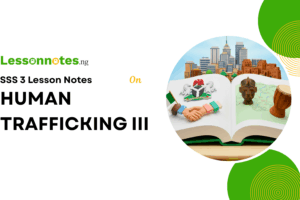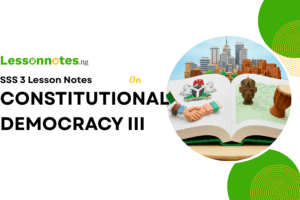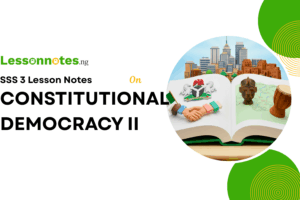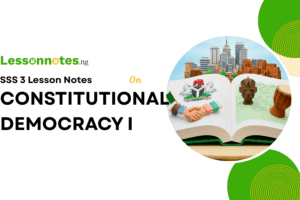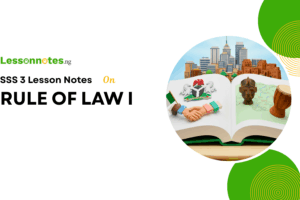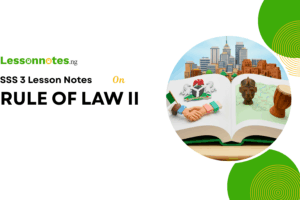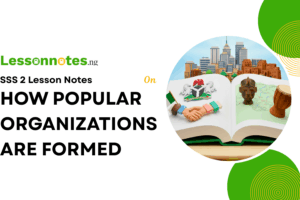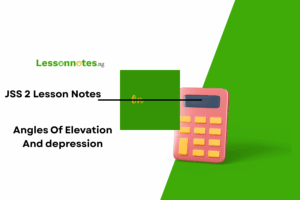Federalism, State And Local Government SS1 Civic Education Lesson Note
Download Lesson NoteTopic: Federalism, State And Local Government
INTRODUCTION
A principle of government that defines the relationship between the central government at the national level and its constituent units at the regional, state, or local levels. Under this principle of government, power and authority are allocated between the national and local governmental units, such that each unit is delegated a sphere of power and authority only it can exercise, while other powers must be shared.
FEATURES OF FEDERALISM
- Each level nation/state is legally independent of its jurisdiction or sphere
- Jurisdiction of the respective level of government I specified in the constitution
- Fundamental provisions of the constitution cannot be unilaterally changed by one level of government
- The power to interpret the constitution and the power of different levels of government are given to the court
- The sources of revenue are specified for each level of the Government
MERITS OF FEDERALISM
- It fosters state loyalties.
- It makes sense for citizens to choose policies to solve their problems.
- It creates laboratories of democracy
- It leads to political stability
- It encourages pluralism that is national, state, and local levels
- It gives people more access to leaders and opportunities to get involved in their government.
- It ensures the separation of powers and prevents tyranny
- It is suitable for countries having a diversity of race, religion and language.
- Local needs are met effectively.
- Responsibilities of the central government are lessened.
- People get training in the art of self-government.
- Small states can have dignity and be safe from foreign aggression
DEMERITS OF FEDERALISM
- Prevents the creation of a national policy
- Leads to a lack of accountability
- Citizen Ignorance
- It is inefficient because of the diversity of law and administration.
- There is always a tug-of-war between national and local interest
- It is highly expensive
MEANING OF THE STATE GOVERNMENT AND LOCAL GOVERNMENT
STATE GOVERNMENT:
A state government is the government of a country subdivision in a federal form of government, which shares political power with the federal or national government. A state government is a unit of government that specifically makes and enforces laws for a state. A state government may have a level of political autonomy, or be subject to the control of the federal government.
Functions Of State Government As A Pillar Of Democracy
- Foreign Relations – Diplomacy and Defense
- Incubate special research, business and development, such as small businesses, space research, job training, unemployment insurance and more.
- Protect and regulate the sustainable use of natural resources.
- Enforce and regulate fair and responsible business practices. Included in this is monitoring monetary policy, giving consumer protection and regulating banking practices.
- Determine and enforce civil laws of property and conduct. This includes the freedoms of the press, religion and rights of property.
- Provide public goods and services for the well-being of the community as a whole, such as infrastructure, vaccination programs, disaster relief, fireworks shows, public parks, basic healthcare, subsidized housing, public education and public utilities.
LOCAL GOVERNMENT:
The local government is a government at its roots. It is also the third tier of government.
Functions Of The Local Government As A Pillar Of Democracy
- Local governments set the overall direction for their local area through long-term planning.
- Local government is responsible for managing and delivering a range of quality services to their communities, such as public health and recreational facilities, local road maintenance, and public libraries.
- Local governments legislate and make decisions in areas over which they have legislative authority.
- The laws made by local governments are called local laws and cover issues such as the activities permitted on public land, animal management, and the use of infrastructure.
- Local governments are also responsible for enforcing local laws and other legislation over which they have authority.
- They develop and implement policies
- The councils often represent their local community on matters of concern to those constituents.
- They perform advocacy on behalf of their constituencies to state and federal levels of government, statutory authorities and other sectors.
Problems Of The Three Tiers Of Government
- Corruption
- Nepotism and favouritism
- Poor financing
- Mismanagement of resources
- Poor planning, monitoring and supervision
- Ethno-religion crisis
- Ghost worker syndromes
The Relevance Of Power-Sharing In The Three Arms/Organs of Government
- People’s rights as citizens of a place are secured.
- The stability of government is guaranteed.
- It promotes adherence to the rule of law
- It promotes focus on national interests/objectives.
- It promotes active participation in governance/politics.
- It promotes healthy rivalry among all tiers/levels of government.
- It promotes rapid socio-economic and political development.
- It ensures peace and harmony in society.
- It encourages different units of government to develop at its own pace.
- It guarantees greater employment opportunities for citizens.
- It brings government programmes and activities closer to the people.
- It promotes efficiency in governance.
- It promotes peace and harmony among the tiers of government.
- It promotes cooperation among the tiers of government.
- It prevents the concentration of power in one tier of government/dictatorship.
- It promotes efficient or proper budgeting/allocation of resources.


